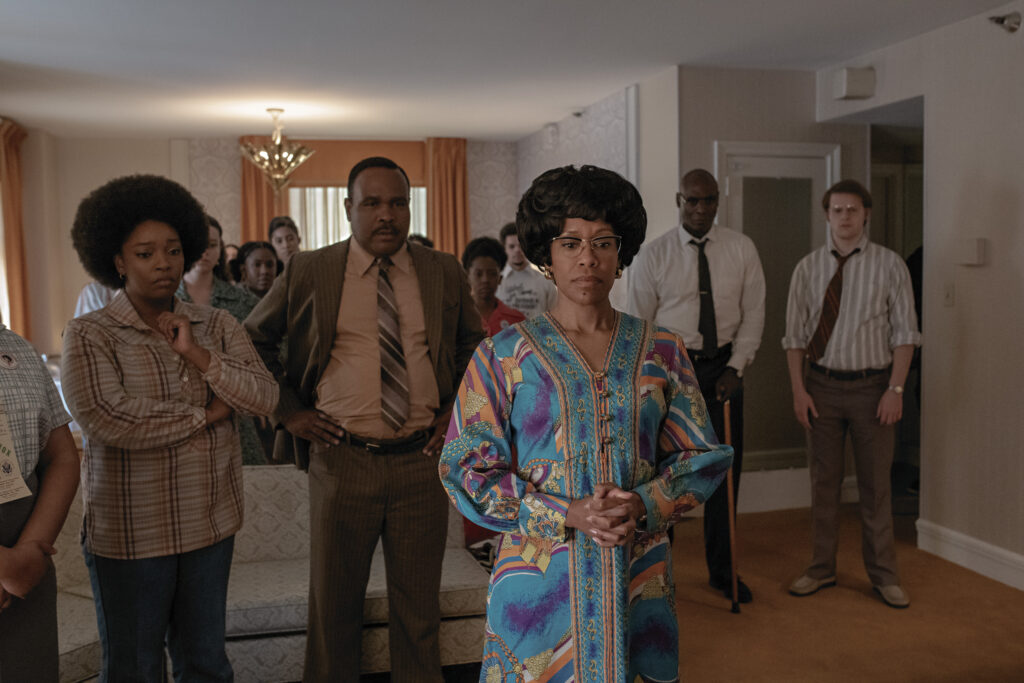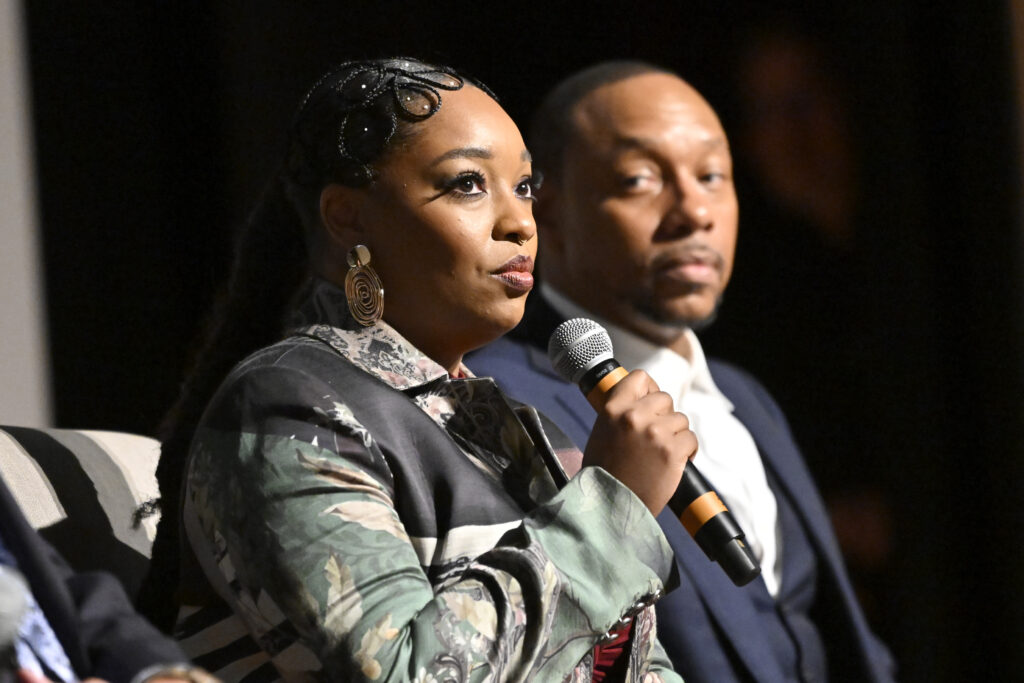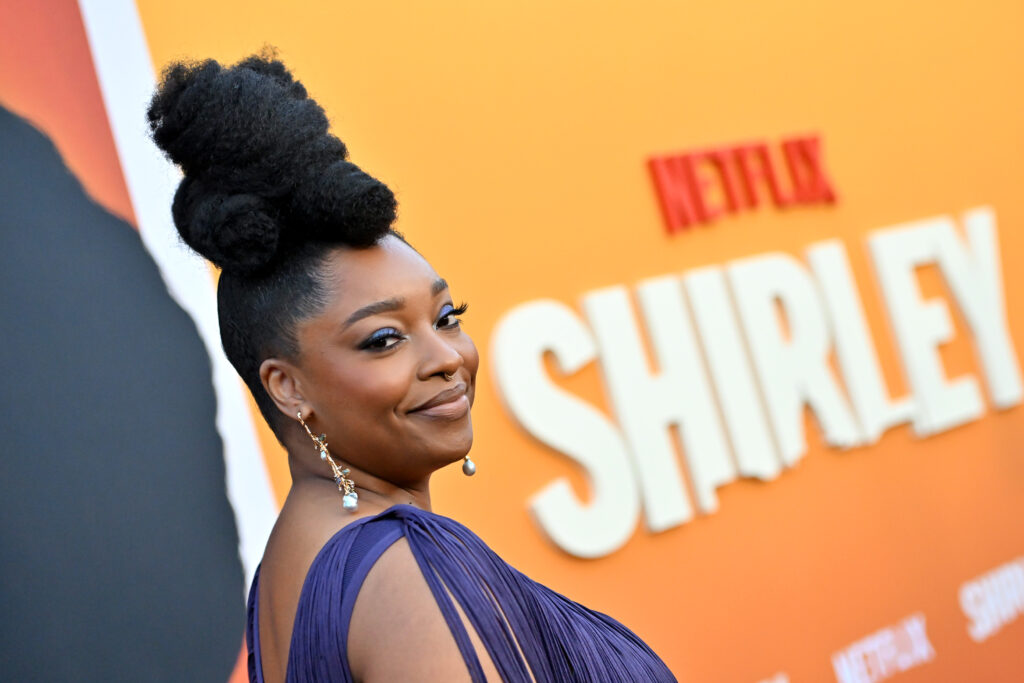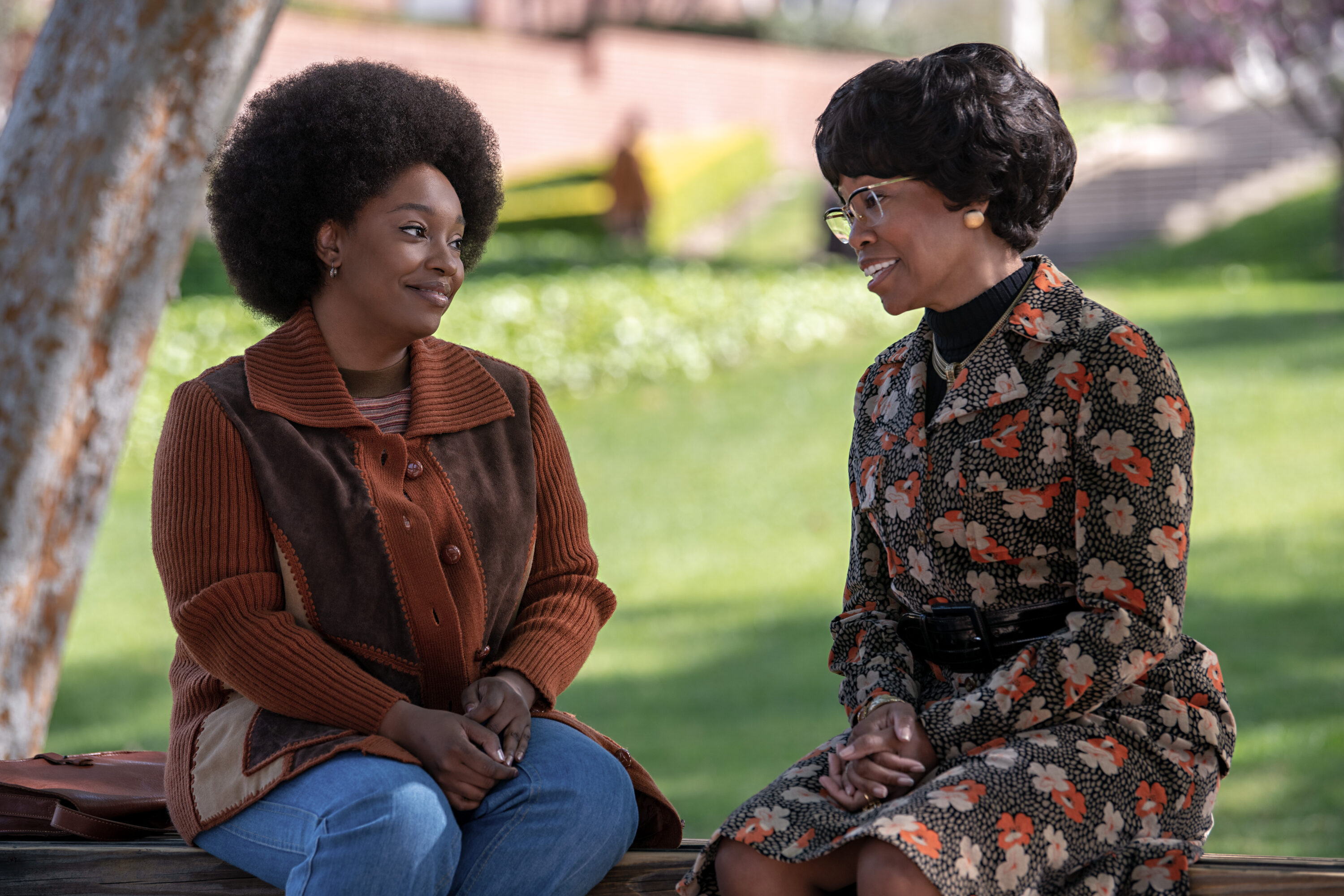In Netflix’s Shirley, Regina King embodies the trailblazing Shirley Chisholm, dramatizing her historic 1972 run for the presidency. King brings to life the legendary congresswoman and advocate for social change, portraying her as an undeterred force in politics with a campaign mantra of being “unbought and unbossed.” Chisholm’s dedication to combating economic, social, and political injustices, alongside her fervent support for Black civil rights and women’s rights, positioned her as a pioneer for change. As the first African American woman in the U.S. Congress in 1968 and a founding member of both the Congressional Black Caucus and the National Women’s Political Caucus, her inspirational revolutionary bucking the system would have made a transformational progressive president. And still would.
One of Chisolm’s proteges was on the trail was California Congresswoman Barbara Lee, a then political neophyte who tentatively joined Chisolm’s campaign, played by the terrific actress Christina Jackson (Devotion, The Night House). It was here that Lee discovered a passion for change that drove her own storied political career directly to the present day.
In several impactful moments, Jackson constructs a character undergoing what will prove a significant individual evolution, capturing a young woman with uncertainties finding purpose in Chisholm’s unwavering dedication to advancing racial and gender equality. In a pair of early-late standout scenes alongside Oscar-winner Regina King, Jackson seamlessly, effectively transitions from youthful enthusiasm and optimism to disillusionment in the face of political defeat.
I recently had the opportunity to chat with Christina Jackson about her Barbara Lee portrait, the evolving state of storytelling within the American film industry and her perspectives on contemporary political idealism. Like her onscreen Shirley counterpart, in person Jackson is considered, insightful and forthright. Our discussion, which took place in the relaxed setting of a restaurant at The Peninsula Chicago, unfolded more as a reflective dialogue than a conventional promotional interview.
One intriguing facet of this character—and I use the term “character” mindful of her being a real-life figure—is her embodiment of youthful optimism within the political landscape. Could you share your thoughts on portraying Barbara Lee, whose subsequent career in politics was devoted to significant advocacy for change?
Christina Jackson: Yes, we know that her story doesn’t end where the film does. In the present day we know what she went on to do. But it was very interesting to be able to portray this point in time—the beginnings of a political career for Barbara Lee moving forward, and the honesty that you see in her: ‘No, I’m not registered to vote; that doesn’t have anything to do with me.’ And ‘No, it has everything to do with you, and this is how you make change and contribute to society.’ She’s a young mom, a student, an activist and is gaining the opportunity to campaign with Shirley and gain invaluable knowledge and experience.
It’s fascinating to observe the scene where Shirley and Barbara sit together in a park setting, engaging in a negotiation about Barbara’s potential involvement in the campaign. This moment is crucial as it lays the groundwork for what will later become Barbara’s own political career.
CJ: It was also one of the last scenes that we shot, so it was nice to be able to have this journey filming the whole movie, knowing everything that we know now and still sitting in front of each other and pretending like we haven’t had this entire experience.
Regina King has been in the movies forever and done everything. She’s an Oscar winner. Yet in this movie, you just can’t recognize Regina King. Time and again I looked at her here and although I have admired her for so long, I did not see her. It was terrific immersion.

CJ: Yes, Regina is a force. Our relationship felt very symbolic to Shirley and Barbara as Regina has been working for 40 years. She did 227 in 1985 and I was born in 1987. And then to watch her not just be a phenomenal actress but also direct- it makes me happy to see her name where I don’t expect to because she still challenges herself. And that is inspiring. Being on this project and able to see her disappear into the world that you see- she had a dialect coach as well as people who had worked on period pieces before, getting everything right including the hair and makeup and wardrobe. To be able to sit and do scenes with her and discover her process was a masterclass, but one that was 15 years in the making because that is how long it took to get the movie made. She exceeded far beyond what could have been, had anyone else been in the role at another time.
Because if you think about it, if the film had gotten like fast track 15 years ago she was a much different actress at that time with different experience. You are now building your own experience. It seems like the right time right now for you in your own career, as if it’s going to take off. How are you going to plot it out? What’s the plan? You must be excited.
CJ: Thank you. I don’t know that there’s a plan. I will say that I’ve been very selective in what I’ve chosen to do and it’s worked out for me. But also I’ve gone through these waves of what I want out of projects. For the last couple of years, I’ve wanted to work on projects that were rooted in love. And whether it’s a Devotion or a Shirley or a Swagger, which I did for Apple, there is a very clear sense of love for people, a spouse or for children. That’s where I’ve been. And Shirley, being one of the most recent things that I’ve worked on, has moved me to want to work with people who are going to make me better. I want to work on projects that are going to challenge me. I also would love a comedy. I’m ready to come to work laughing.
It is exciting, but also I just think of myself as doing the work. And I’ve been very pleased with the things that I’ve done so far. It gave me a great feeling to know that Regina, Reina and John trusted me to come into his collective and be an equal to them as far as responsibility and telling the story. I’m excited at what the possibilities are moving forward, especially with storytelling. Hopefully the industry is more willing to hear more of the stories that we’ve kind of historically swept by the wayside.

That is an interesting topic given all the movement the Academy is making for next year’s Best Picture representation and inclusion criteria. Yet recently saw Issa Rae talking about what’s really happening in the industry behind the scenes. We saw several chief diversity officers let go last year at several studios and entertainment companies. At the same time you have an industry outwardly signaling that they are leading with DEI. But in reality you have shows being canceled, people losing strategic jobs and so forth.
CJ: Yes. On Apple’s Swagger, my character is brought in as a DEI chief at a school. And the importance of what that is and what it means and the fact that we even need it, only to see it so quickly being rolled back, not just in the industry but also at schools and universities… It’s a very interesting place to be in, but I do think that that we have enough people that are able to be vocal about it, like an Issa. And I think that she was very honest in that we are just going have to figure out another way to tell our stories.
Yes, it has to be a long-term movement rather than a singular moment in time.
CJ: Right. It is not impossible and it is very much needed. Everything doesn’t have to include everyone. You are allowed to tell these stories that focus on one particular time, one particular subject or one particular space. Everything doesn’t have to be perfect. Everything doesn’t have to be a masterpiece. And so I’m hopeful. I do have optimism that everything doesn’t have to be about the first Black whoever, like we could just tell a story about this person right here. But we do have the responsibility to tell these stories.
Interesting to consider when we think about American Fiction or Radha Blank’s terrific The 40-Year-Old-Version. You’ll remember that in that film she wanted to tell that story about a middle class married couple in Harlem, but not necessarily in a commercially palatable way for certain audiences, and the compromises that she had to make in that.
CJ: Yes, Radha. And I’ve been a fan of Issa since her web series. I watched how she pitched it to HBO and what it later became. And it’s different. But she was able to cover things that we were able to talk about, and the day after each episode would air Twitter would then be on fire with conversation: ‘What did you think about this?’ and ‘I love this.’ It’s hard to get anything made because there are so many working parts. We see it on these large scales and there is much talk about money, but even if you just designated a little bit of that to telling more stories. Everything doesn’t have to be six seasons. Everything doesn’t have to be three and a half hours long. There’s so much room that we have to play with here. It is not impossible. It’s just a matter of those stories being seen of value.

Shirley is set in 1972 and everything is happening with the war and civil rights, and the country is in tumult. There is this kind of radical youth movement that everybody coalesced around. As we see in the movie, it even rallied around Shirley herself. So as a candidate for change, somebody who was representing the poor and disenfranchised, people of color, women and gender equality—those were things people strongly believed in and you can feel that movement in the movie. And if we look to 2024 and think about like political movements today, and the struggle to get young people involved—maybe the way Barbara Lee got involved—I don’t know if we have that sort of youthful belief in politics anymore, or that politics can create change. Maybe that is the lack of an inspirational candidate. Do you see a difference between a young person today thinking about politics and maybe Barbara Lee at the time?
CJ: Are there differences? Yes, of course, right? But even for as active as Barbara Lee was, she still wasn’t registered to vote because she didn’t think that was where change was going to come. Fast forward 50 years later she’s telling everybody to vote. But I feel like now, with social media specifically, you see so many young people who are studying, traveling, sharing their experiences and thoughts and feelings, and there is this idea of, ‘We need to register to vote. We can organize at campuses. We can reach out to our congressmen.’ Did you know that technically your councilman is supposed to talk to you for an hour a week? There’s all of this information, and there’s also connectivity.
I do think that you’re right in that defeatist feeling of, ‘It doesn’t matter.’ But I do see a lot of it the opposite way, where when we have young Black councilmen getting elected or we have women becoming mayors, where for the first time a young Black person has achieved this position. I do see the change and how importantly people are taking this, and it does make me hopeful. I do think with this film people will see a bit more, gaining a clear depiction with how delegates work, what you need to move forward and so forth. I think that in this country there are many people who don’t have a clear understanding of how politics work, which makes it difficult: ‘This is too complicated. They’ve already rigged it and so I’m not going make the effort.’
Or ‘both parties are the same,’ so why should I care, you know?
CJ: Yes. But a lot of people don’t even know that there are more than two political parties. So that’s another reason why I think movies like this are important. We also have access to more information than we have ever had in history. Let’s not drown in it. You know what I mean? Let’s educate ourselves the best way we can and then pass that on however we can.
You realized in middle school that you wanted to be an entertainer; you were a singer, I believe. You had a middle school teacher that was instrumental. If you were to go back to middle school and tell yourself something about your career as it has now been realized, what would be it? At the same time, you have been on stage in New York, done numerous television series and movies. Has your dream been realized?
CJ: I don’t think I ever came into this wanting any one thing particular. For me, job by job, experience by experience, I’ve had the opportunity to work with some amazing people and learn great things by watching them. There are times that I can’t believe that I get to do what I do, but if I had to talk to a young Christina, the best part of my job has been the opportunity to play so many different characters. It’s the variety of it all. And not just directors, but also really great writers.
For a long time I would be the only Black woman in these spaces. And there would be times where I would not agree with what was being written for me, because I was like, ‘This is not how Black women talk.’ For a long time I felt like I was the only one. Then gradually working with more Black directors and Black writers, it has made me happier to truly be seen on the page. And so that would be the thing I might say to younger self: ‘You can’t see it now, but you’re going to work on some really, really great projects and tell some really, really great stories, and bring visibility to Black women that you don’t normally see.’
This interview has been edited for length and clarity.



